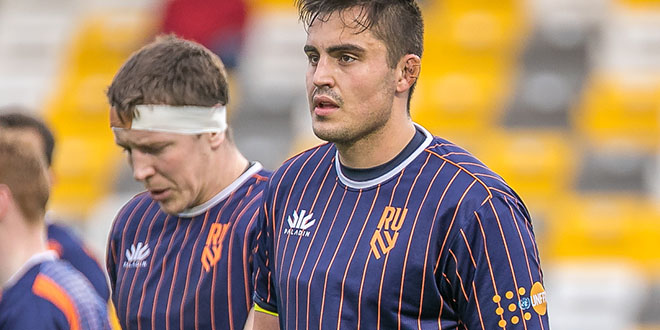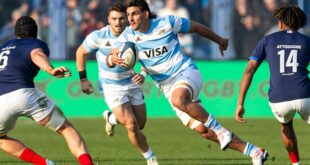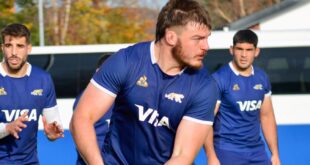A recent decision from the World Rugby Executive Committee to extend the Regulation 8 amendment regarding residency qualification by one year has not come without criticism. The new five-year requirement was to come into effect on January 1, 2021, but has now been pushed to 2022. That it was made behind closed doors without a full council vote and with no public announcement until only recently is suspect to say the least.
World Rugby’s reasoning was that the COVID-19 pandemic reduced the number of international fixtures and therefore players who might have qualified under the existing three-year standard would miss out and be forced to wait another two years to represent their new nation. The solution given, however, clearly favors the European nations who are set to have players qualify two years earlier than they might have otherwise.
Scotland are certain to call upon former Junior Springbok and current Edinburgh loosehead Pierre Schoeman in the second half of 2021, with Italy eyeing Benetton’s Fijian finisher Iliesa Ratuva Tavuyara. Wales will have access to Ospreys tighthead Tom Botha and Argentine loose forward Guido Volpi, the latter’s Welsh eligibility ironically ‘saved’ due to the season’s cancellation after he was loaned to Doncaster. France may have a look at New Zealand Māori flyhalf Ihaia West, who will fulfill his three-year requirement in time for the fall tests provided he stays on in the Top 14.
Worryingly for the USA selectors, Ireland will have an opportunity to potentially cap Hawaiian prop Roman Salanoa in any of their 2021 tests, including those scheduled during the Lions tour of South Africa. One hopes his allegiance remains with the Eagles but his Munster contract almost certainly requires him to remain eligible for the green jersey.
These cases while small in number are an advantage that the USA, for example, will not enjoy. The timing of the European leagues dictates that new players arrive for preseason training in July with even delayed signings typically in place ahead of the November tests. Major League Rugby, however, begins in February with new signings arriving in December and sometimes not until January. This means that in almost every case those eligible on residency in 2021 would have already been qualified in 2020.
Given that the chances of the USA playing any further international rugby in 2020 are slim at best, the residency extension appears justified. The ‘Tier 1’ nations, however, are all set to play before the end of this year with Japan also included in the proposed eight-nation European tournament. For these nations the extension is a bonus, there is no real justification for an extension. World Rugby might simply have granted an exemption for those countries – such as the USA – who were deprived entirely of opportunities to cap players.
Politics aside, there are some Americas players who could take advantage of the new cut-off date. With the Súper Liga in its infancy there will no benefit to any of the South American teams. Canada having only one professional team – the Toronto Arrows – will also gain nothing from the change. The Eagles, however, will have a handful of new players to consider thanks to MLR.
Among the uncapped are Seawolves captain Riekert Hattingh, new Dallas scrumhalf Carlo de Nysschen, and versatile backs Nick Feakes of NOLA and RUNY’s Troy Lockyear. All, however, would have been already qualified in 2020. RUNY second row Charlie Hewitt arrived in time to qualify for the November 2020 tests. He will now stay eligible through to January of 2022.
Another lock, San Diego’s Ben Mitchell, is an interesting case. Having arrived in early December of 2017 he would not have made the January cut-off unless he was included in the Eagles Sevens team for the Cape Town tournament typically played on the first weekend of December. With that tournament already cancelled, Mitchell could be considered a ‘bonus’ option for the USA in 2021.
Others who could potentially fall under that bracket are MLR newcomers Cam Dodson, Matthew Gordon, and Harry Masters. All three arrived at their schools in 2017 so might have qualified in time for the November series but selection would have been less likely. They will now have a season of MLR to prove their case.
A number of players who likely would have come to the attention of Eagles selectors will just miss out having arrived in December of 2018. Those include Seattle trio Stephan Coetzee, Brad Tucker, and JP Smith. RUNY center Will Leonard is another example. The USA might want to schedule a Christmas test next year against Canada outside of the November window to claw back some of the advantage afforded to those in higher places.
NOTES: Seattle tighthead Tim Metcher could have potentially qualified but played the 2019 Mitre 10 Cup season in New Zealand which likely negated his consecutive residency. Utah loosehead Franco van den Berg was captured by South Africa in the 2016 World Rugby u20 Championship. World Rugby expanded the u20 capture umbrella for designated ‘Next Senior’ teams to the entirety of the tournament on July 1, 2014, a ruling that stood until January 1, 2018.
 Americas Rugby News Rugby news from across the Americas!
Americas Rugby News Rugby news from across the Americas!




